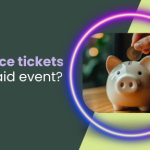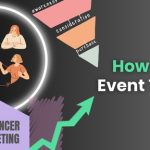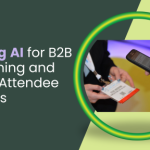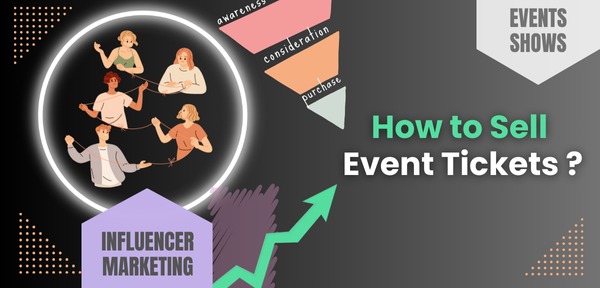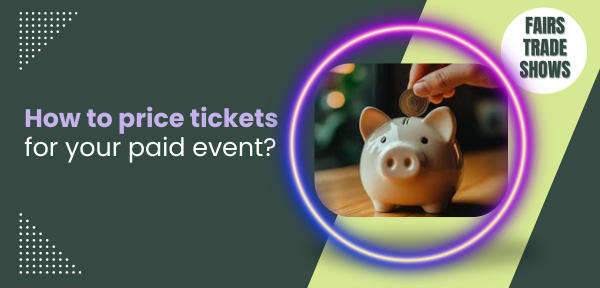Selling event tickets today can be a big challenge, but with the right strategies, you can ensure your 2024 event is a sell-out success. Whether it’s a corporate conference, a music festival, or a networking event, selling tickets is key to ensuring attendance and meeting your event goals. To help you out, here are some proven strategies like early-bird discounts, influencer marketing, social media campaigns, and referral programs that can help you maximise ticket sales.
1. Early-Bird Discounts
According to Eventbrite, events that use early-bird pricing see 50% higher ticket sales during the early stages of promotion.
Offering early-bird discounts is a popular strategy that works wonders for creating a sense of urgency among potential attendees. Limited-time, reduced-price tickets encourage people to act fast to secure a deal, and it helps you gauge initial interest in your event.
How to implement early-bird discounts:
- Set a deadline for the discount period, typically 2-3 months before the event.
- Promote the urgency of purchasing tickets early through countdowns and reminders on your website, social media, and email campaigns.
- Offer tiered pricing (e.g., early-bird, standard, last-minute) to incentivize earlier purchases.
2. Influencer Marketing
Influencer marketing is a powerful way to boost ticket sales by tapping into the trust and reach of influencers within your event’s niche. When influencers recommend your event, their followers are more likely to pay attention and consider attending.
How to incorporate influencer marketing:
- Identify influencers whose followers match your event’s target audience.
- Partner with influencers to promote your event through social media posts, blog articles, or video content.
- Offer influencers exclusive discount codes for their followers to incentivize purchases.
- Consider inviting influencers to attend and speak or participate at the event, further boosting credibility.
3. Social Media Campaigns
Social media is one of the most effective ways to market your event to a wide audience. Running targeted social media campaigns can significantly increase visibility and drive ticket sales.
How to create successful social media campaigns:
- Choose the platforms where your target audience is most active (Instagram, Facebook, LinkedIn, Twitter, etc.).
- Use paid ads to target specific demographics, including location, interests, and behavior.
- Promote behind-the-scenes content, countdowns, and testimonials from past attendees.
- Encourage social sharing by offering discounts or giveaways for people who share your event posts.
Tip: Facebook and Instagram ads are particularly effective for event promotion. Facebook’s event ad platform offers advanced targeting options to reach people who are more likely to attend based on their interests and past behaviour.
4. Referral Programs
Referral programs incentivize your current attendees to spread the word about your event, helping to expand your reach through word-of-mouth marketing. This strategy works because people are more likely to trust recommendations from friends, family, and colleagues.
How to set up a referral program:
- Offer discounts, cashback, or freebies for attendees who refer others to purchase tickets.
- Use a simple referral link system so attendees can easily share it with their networks.
- Promote the referral program on your website, email newsletters, and social media.
5. Email Marketing
Email marketing remains one of the most effective ways to communicate directly with your potential attendees. By nurturing your email list, you can keep your audience engaged with timely updates, special offers, and reminders about the event.
How to maximise email marketing for ticket sales:
- Segment your email list by interests, past attendance, or ticket status to send targeted messages.
- Send regular updates leading up to the event, including early-bird reminders, speaker announcements, and schedule highlights.
- Create a compelling call-to-action in every email, encouraging readers to buy their tickets before they sell out.
- Use countdown timers and limited-time offers to create urgency.
Tip: Personalised emails have a 29% higher open rate and a 41% higher click-through rate, according to Campaign Monitor, making it important to tailor your email messages to specific segments of your audience.
6. Partner with Sponsors for Added Reach
Partnering with event sponsors can help extend your reach and give you access to new audiences. Sponsors can help promote your event through their channels, boosting credibility and exposure.
How to leverage sponsors for ticket sales:
- Offer sponsors special ticket deals for their customers or employees.
- Encourage sponsors to share your event across their email lists and social media channels.
- Co-host ticket giveaways or exclusive pre-sale promotions in collaboration with your sponsors.
7. Use FOMO (Fear of Missing Out) to Your Advantage
FOMO is a powerful psychological motivator that can drive ticket sales by making people feel like they’re missing out on something exciting. Highlighting exclusive features, limited availability, or unique experiences can prompt people to act fast.
How to create FOMO in your ticket sales strategy:
- Showcase exclusive perks for early buyers, such as VIP access or backstage passes.
- Promote limited-time offers, limited seating, or special guests that people don’t want to miss.
- Share testimonials and highlights from previous events to build excitement and trust.
Adding social proof, like “90% of tickets sold,” or “Only 50 spots left!” helps create urgency and fear of missing out, encouraging more sales.
Maximise Your 2024 Ticket Sales with Smart Strategies
Selling out your 2024 event is achievable with the right strategies in place. Early-bird discounts, influencer marketing, social media campaigns, referral programs, and email marketing are all proven methods to drive ticket sales and ensure your event’s success. By leveraging these techniques and using data to refine your approach, you’ll be well on your way to hosting a sold-out event that leaves attendees excited and engaged.

